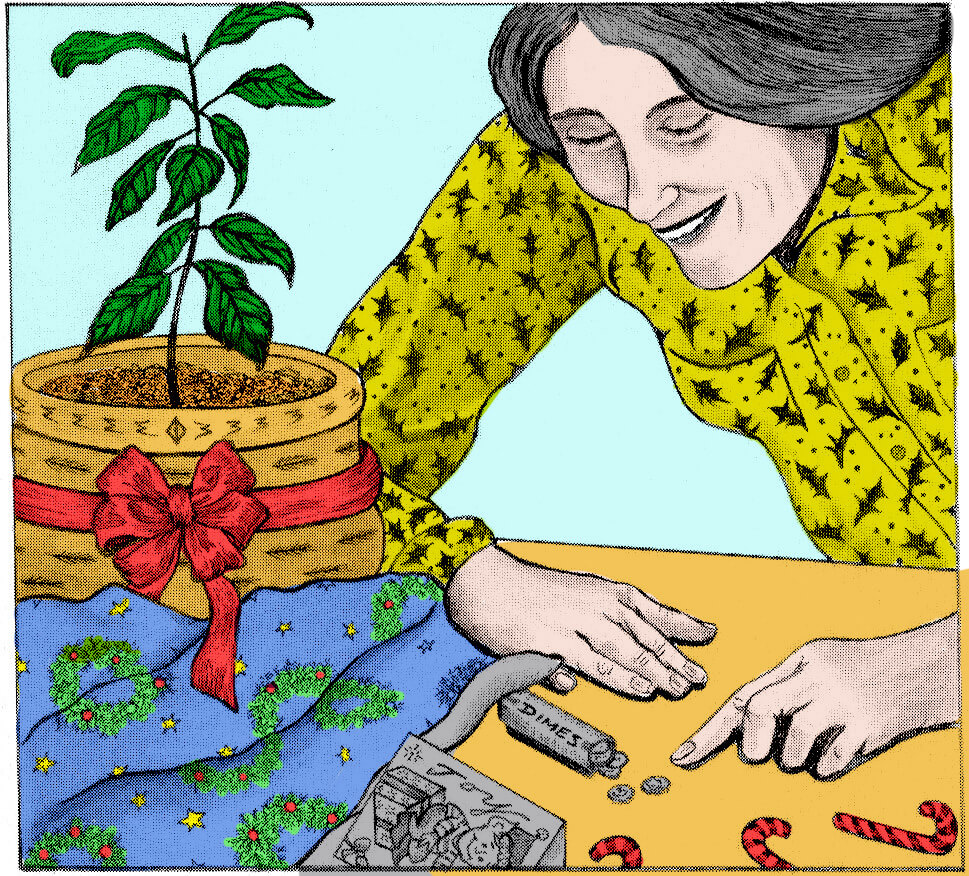Read by Michael Flamel

At the middle school where my wife, Carole, and I teach, we have a small coffee room—with four coffee pots. Two perk regular coffee, one holds decaffeinated, and one has hot water for tea or cocoa. A side cabinet holds the coffee cans, sweeteners, teas, cups, lids, stirrers, etc. All throughout the day, people descend on the coffee room for their caffeine fix. There are always people coming and going.
Carole maintains it all. She inherited the job after Vicki, the teacher who had it before her, retired. It’s not easy—every free moment, she’s in there taking care of business. On weekends, she shops for supplies, just like Vicki had done.
The money to operate the coffee room comes from the faculty. A little sign reads, “The Coffee Room Runs On Donations From Those Who Use It.” Often, people also bake cakes, cookies, and brownies and deliver them to the coffee room for everyone to enjoy.
Of course, Carole takes a lot of abuse from her coworkers, who are really her friends—although sometimes you’d wonder.
“Carole, this coffee’s not hot enough.”
“Carole, this coffee is too hot.”
“Carole, this coffee tastes soapy.”
“Carole, this creamer isn’t fat-free. Are you trying to make me fat?”
“Carole, it’s your fault I spilled coffee on my new blouse. If you hadn’t suggested trying the French roast, it never would have happened!”
“Carole, did you buy a jar of clover honey? You know I only sweeten my tea with clover honey.”
As you can see, she doesn’t get a whole lot of appreciation. To make matters worse, sometimes the donations don’t generate enough money to cover expenses. Carole—along with a few other kind souls—oftentimes absorbs the cost of supplies.
One day when Carole was preparing coffee, Mrs. Jones entered. A throwback to the 1960’s, she still teased her hair and wore orange shades of lipstick. She poured herself a cup of coffee—it was her fourth that day, she revealed—and polished off the remaining three walnut brownies that were on the counter. Then she dropped a dime in the money dish. Carole was incensed.
“Carole, this is wonderful coffee. What’s your secret?” Biting her tongue, Carole replied, “Well, I grow, pick, roast, and grind the beans myself.”
“Really!”
“Yes, I cultivate a little coffee plantation in the basement. It’s a lot of work, but George helps.”
“Really,” she tittered, as she left the room.
That night Carole vented. “People are generous—or cheap, George. One dime! Now I know what Vicki used to complain about.”
A week before Christmas, the coffee room was hopping. Carole had decorated it with live evergreen boughs and a large poinsettia. Many people had baked and put out holiday goodies—oatmeal raisin cookies, gingerbread cupcakes, macadamia brownies, nut crescents, even cream-cheese apricot cookies. The treats and a December cold snap had people scurrying for steaming hot coffee.
On the last day of school before Christmas break, Carole entered the coffee room early in the morning. She found a wrapped present on the table next to the poinsettia. A little holiday card read, “To Carole, I appreciate all your hard work. I flew all the way to Ethiopia to get this present for you. Merry Christmas!” It was unsigned.
Carole carefully unwrapped the gift. It turned out to be a beautiful plant with shiny leaves in a decorative red flower pot. The tag read, “I am the coffee plant (Coffea arabica), origin Ethiopia. Give me high light and keep me moist.”
“How fitting!” Carole laughed. As she stood there admiring the coffee plant, out of the corner of her eye she noticed another note in the bottom of the gift box: “Oh—I need this special fertilizer to grow best.”
Under the note was a whole roll of dimes! ❖
This article was published originally in 2007, in GreenPrints Issue #72.


 Previous
Previous

